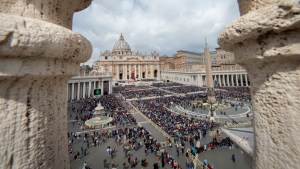Even though an explicit belief in a triune God did not arrive until the incarnation of Jesus and the advent of Christianity, there exists veiled references to such a belief in the Jewish Old Testament.
In the first verse of Genesis the author writes, “In the beginning, when God created the heavens and the earth—and the earth was without form or shape, with darkness over the abyss and a mighty wind sweeping over the waters” (Genesis 1:1 NABRE). This particular translation mentions a “mighty wind,” while other translations render it as “the Spirit of God.”
The Hebrew word used by the biblical writer was ruah, and Christian theologians have repeatedly pointed to it as the first reference to the Holy Spirit. Lea Sestieri wrote in her article, “The Jewish Roots of the Holy Spirit”: “Although in Jewish scripture the Holy Spirit is never presented as a person but rather as a divine power capable of transforming the human being and the world, the fact remains that Christian pneumatological terminology is rooted in that of the Jewish religion.”
She continues, “The term: ‘Spirit’ translates the Hebrew word ‘Ruah,’ which in its primary sense means breath, air, wind. Jesus indeed uses the sensory image of the wind to suggest to Nicodemus the transcendent newness of him who is personally God’s breath the divine Spirit’ (CCC691).”
The Catechism further explains how, “The Word of God and his Breath are at the origin of the being and life of every creature: ‘It belongs to the Holy Spirit to rule, sanctify, and animate creation, for he is God, consubstantial with the Father and the Son … Power over life pertains to the Spirit, for being God he preserves creation in the Father through the Son'” (CCC 703).
St. John Paul II also pointed out this connection during a general audience in 1990. He wrote, “In such texts, we can see a distant preparation of the Christian revelation of the mystery of the Most Holy Trinity: God the Father is the beginning of creation; he carried it out through his Word, that is, through his Word and Son and through his Breath, the Holy Spirit.”
John Paul II continues, “In the Bible, the Hebrew term for the Spirit is ruah. The first meaning of this term, and that of its Latin translation ‘spiritus,’ is ‘breath’ … A breath is the most immaterial reality we perceive; it cannot be seen; it is intangible; it cannot be grasped by the hand; it seems to be nothing, and yet it is vitally important. The person who does not breathe cannot live. The difference between a living person and a dead one is that the former has breath and the latter no longer does. Life comes from God. Hence breath, too, comes from him and he can take it away (cf. Ps 104 [1O3]:29-30). Seeing breath in this way, they came to understand that life depends on a spiritual principle, which was called by the same Hebrew word, ruah.”
The trinitarian belief in God is one of the greatest mysteries of Christianity, one that we will not fully understand on this earth. Yet, hints of God’s marvelous plan can be seen throughout the Old Testament, especially in the book of Genesis, preparing the way for the ultimate revelation of himself in the person of Jesus Christ and the Advocate, the Holy Spirit.

Read more:
A relationship with the Holy Spirit is as simple as this one word

Read more:
Why Jesus created a Church, and not just a Bible

